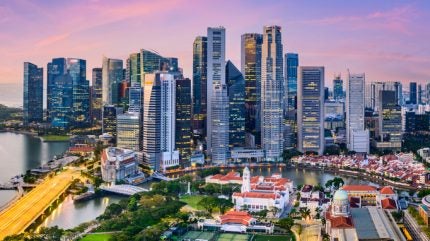
Investors are increasingly focused on biotech companies outside of China operating in the Asia-Pacific (APAC) market, according to a report by management consulting firm Bain & Company.
Homing in on Singapore specifically, the report states that rising players within the APAC region are drawing in investors through their political neutrality, protection of intellectual property (IP) and strong healthcare infrastructure.

Discover B2B Marketing That Performs
Combine business intelligence and editorial excellence to reach engaged professionals across 36 leading media platforms.
This trend is further driven by continued investment by the Singaporean Government, which has handed out $25bn in early-stage funding between 2021 and 2025 through its Research Innovation and Enterprise 2025 (RIE2025) scheme.
Singapore is also aiming to bridge the gap between academia and industry through its A*STAR scheme, which is designed to encourage the translation of research into commercially viable drugs.
These initiatives are designed to de-risk the early-stage development process, laying the foundations for future venture capital investment.
Changing tides in the biotech sector
The 2020s have been a tough period for the biotech industry, with many companies failing to obtain funding amid growing geopolitical instability and a sharpened investor focus on late-stage therapies.

US Tariffs are shifting - will you react or anticipate?
Don’t let policy changes catch you off guard. Stay proactive with real-time data and expert analysis.
By GlobalDataHowever, things may be looking up for the sector, with a GlobalData report finding that biotech companies obtained $8.52bn in 2024 through initial public offerings (IPOs) — a marked increase from the $5.06bn raised in 2023.
Though the US and China continue to dominate the market, rising tensions between the nations could shift the balance towards politically neutral and stable nations, stated Alison Labya, senior pharma business fundamentals analyst at GlobalData.
Labya said: “Singapore’s alignment with international pharmaceutical standards reduces legal and regulatory risk, increasing investor confidence in the commercial potential of innovative drugs.”
As the US continues to face geopolitical uncertainty, NIH funding cuts and mass regulatory layoffs, Labya noted that APAC players — particularly Singapore — are emerging as attractive alternatives for biotech investors, offering a more stable environment conducive to bringing drugs to market.
Biotech’s future moving forward
Even amidst the growing geopolitical tensions between the US and China, Labya stated that China will likely remain the dominant force in Asian biotech.
“China remains resilient in the face of Trump’s trade war, notably retaliating with 125% tariffs on US goods in April 2025,” Labya commented. Through this response, both countries reduced their import tariff rates, highlighting China’s capacity to influence trade and policy outcomes.
Large pharma has also continued to engage with the Chinese biotech market, with 28% of innovator drugs now being picked up from the nation, according to a report from GlobalData.
For APAC countries such as Singapore to compete with China, Labya noted that biotechs in the region must penetrate the US and EU, requiring expertise into the FDA and EMA’s regulatory frameworks, as well as the development of international partnerships.




